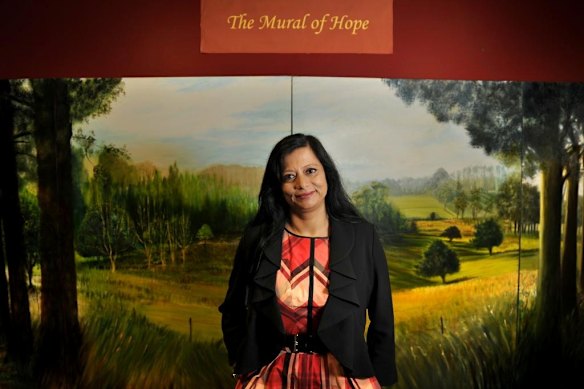They have signed a petition to the Pharmaceutical Benefits Advisory Committee and the federal government, stating: “There are currently nine PBS-listed treatments for men’s sexual health, and ZERO listed for women.”
‘Men’s sexual health is routinely subsidised. But women have to fight for theirs — or fund it themselves.’
Petition to the Pharmaceutical Benefits Advisory Committee and the government
“Men’s sexual health is routinely subsidised. But women have to fight for theirs — or fund it themselves. That’s not healthcare. That’s a double standard,” states the petition, which was launched in June by Dr Ceri Cashell, a New South Wales GP.
Cashell said: “Every week, women tell me that testosterone was really helping, but they had to give it up because it’s just too expensive. And that is not right.
“I used to hear this all the time about Prometrium (body-identical progesterone). And having Prometrium listed on the PBS has been a life-saver for many of my patients, sometimes literally, because of its profound effects on sleep.”
In her submission to the Senate’s inquiry into issues relating to menopause, Cashell called for three body-identical hormones: estradiol, micronised progesterone, and testosterone “to be accessible and affordable for Australian women who need to use them”.
Because only the first two are PBS-listed, and testosterone treatment for hypoactive sexual desire disorder is so expensive, Griffith University steroid-use researcher Dr Tim Piotkowski says women are obtaining testosterone intended for men and attempting to measure suitable amounts, risking side effects.
“Women are not being afforded access to things that men are,” Piotkowski said. “These women often feel overlooked by traditional healthcare and unsupported when they seek help.”
Collins put it like this: “Women are suffering, and our sex lives are so important for our health … it’s a healthy part of our lives, having that connection and intimacy with someone.”
When that desire is absent, “you just don’t want to have anyone near you at that stage”.
Endocrinologist, Professor Susan Davis, a spokeswoman for the Australasian Menopause Society and long-term researcher at Monash University, agrees testosterone treatment should be subsidised, but only on authority script to prevent it being prescribed for menopause symptoms other than hypoactive sexual desire disorder.
Long-term menopause researcher, Professor Susan Davis, agrees that testosterone for hypoactive sexual desire disorder in women who are distressed by it should be PBS-listed, but only on authority script.Credit: Penny Stephens
Debate and discussion about the perceived wider benefits of testosterone for women has raged among menopause advocates, and publicity on social media has caused a big spike in demand.
But Davis, a former president of the International Menopause Society, said there was only evidence of its effectiveness for hypoactive sexual desire disorder. Some claims made about testosterone’s other potential benefits for midlife women were “overselling the need and the benefit”.
Testosterone supplementation at midlife has been promoted as being able to improve women’s low mood, concentration, memory and sleep problems. It has also been said to protect women’s bones, muscles and brains.
Such claims were unproven, and “making women feel they are missing out if they are not on it”, Davis said. She noted that there was only one medication for male erectile dysfunction on the PBS, and it was available only on authority script.
Davis’ team has studies under way examining how testosterone treatments effect women’s muscles and bones, but she said that in claims already being made about its benefits: “The language is quite emotive, and raises a red flag.”
‘The guideline is this can increase the number of sexually satisfying events [for the woman] by one per month, which is not a lot.’
Professor Martha Hickey, Melbourne University and Royal Women’s Hospital, Melbourne
“There is no evidence for [those benefits] at this point.”
A paper Davis helped write was used by the petition authors to source the statistic that one-third of Australian women experience hypoactive sexual desire disorder, but she now considers that data to be “a rough estimate”, and said an imminent paper would suggest the accurate proportion is “about half of that”.
The clinical benefit of AndroFeme 1 for women experiencing low sex drive had been shown to be modest, said Professor Martha Hickey, chair of obstetrics and gynaecology at Melbourne University.
Loading
“The guideline is this can increase the number of sexually satisfying events [for the woman] by one per month, which is not a lot,” she said.
“Depending on what you’re starting from, it is not that much. And this drug has only been shown to be effective in that specific condition.”
Hickey also disputed the accuracy of the figure of one in three women experiencing hypoactive sexual desire disorder, as distinct from low libido, in midlife: “And low libido is not what this is for. The other thing is there’s no safety data available on AndoFeme 1 use beyond 12 weeks.
“It’s a hormone, and hormones have powerful effects in many organs of the body,” Hickey said.
Evidence did not support the suggestion that testosterone dropped significantly at menopause, like oestrogen has been shown to, contrary to what has been suggested by some of its proponents online.
“I’m very suspicious of the commercial forces that are driving this,” Hickey said.

Women’s mental health specialist, psychiatrist Jayashri Kulkarni, wants testosterone for women subsidised by the PBS as part of menopausal mental ill-health treatment.Credit: Penny Stephens
But women’s health psychiatrist Professor Jayashri Kulkani, director of Monash University’s HER Centre Australia and of the Multidisciplinary Alfred Psychiatry research centre, says subsidising testosterone therapy for women goes beyond its proven benefits for low libido.
“It [testosterone] is the third hormone for all of the menopause-related issues that many women experience, including mental ill-health,” she said.
“The petition and advocating group have picked HSDD because they think there is more evidence for AndroFeme in treating this issue but in actual fact, it is a hormone treatment that is part of menopausal hormone therapy for all of the symptoms that many (but not all) women experience in the menopause transition.”
Kulkarni said that women should have access to PBS-subsidised testosterone for reasons beyond sexual dysfunction.
Loading
“The bigger picture here is menopausal mental ill-health [depression, anxiety, brain fog] is the really big issue,” she said.
“So I agree with the petition to get AndroFeme 1 on the PBS but for the bigger cause, not just HSDD.”
A spokesperson for the Department of Health and Aged Care said the government and the Pharmaceutical Benefits Advisory Committee would welcome applications to list AndroFeme1 or similar testosterone products on the PBS.
The Morning Edition newsletter is our guide to the day’s most important and interesting stories, analysis and insights. Sign up here.
Read the full article here

